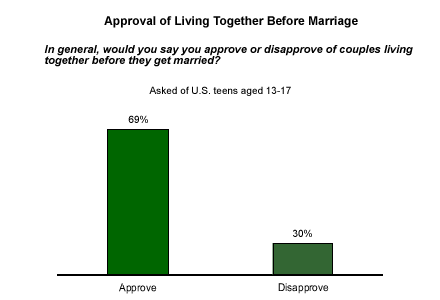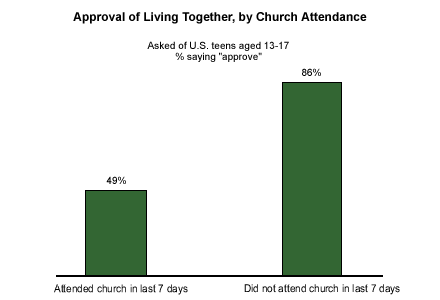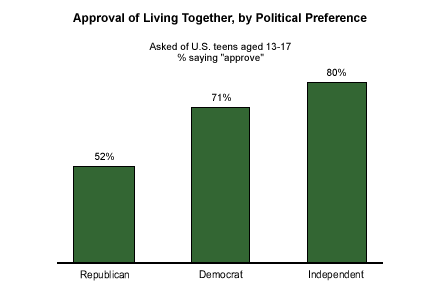Living together before marriage, or even in place of marriage, is a phenomenon that gained prevalence in the United States in the 1960s and has grown steadily since, most notably among young people. The most recent Gallup Youth Survey* suggests that this trend will continue -- nearly 7 in 10 teens support the idea of couples living together before marriage.
But not all teens are so enthusiastic -- 30% disapprove of the practice, and traditional values are favored at higher rates among certain demographic groups.

Religious teenagers, defined as those who have attended church or synagogue in the last seven days, are evenly divided in their views on the appropriateness of unmarried cohabitation, with 49% approving and 49% disapproving. This level of support is far lower than that (86%) found among teens who did not attend church recently. One youth pastor in New Jersey says she finds it encouraging that the "sacred covenant" established by God still has meaning for some teens, but worries that, because so many teens have experienced the divorce of their parents, wedding vows may no longer mean as much.

Views Differ by Political Leanings
Teens' political leanings also appear to have some bearing on their opinions about living together. Just over half (52%) of teens who say they will vote Republican when they are old enough approve of cohabitation, compared with 71% of teens who say they'll vote Democratic. Eighty percent of teens who plan to be political independents approve of living together before marriage.

But this connection has some basis in religiosity, as well. Past Gallup surveys indicate that many more Republicans -- both adults and teens -- attend church on a regular basis than do Democrats or independents. But even among those teens who said they had been to church there was a partisan difference, with Republican churchgoers less supportive than Democratic churchgoers.
Bottom Line
Obviously, there is a strong connection between teens' religious and moral views and their views on issues such as living together before marriage. As part of a 2003 Youth Survey, Gallup asked teens whether they feel that sex between unmarried men and women is morally acceptable or morally unacceptable. The resulting pattern is similar to that for cohabitation: Nearly two-thirds (63%) of churchgoers find sex between unmarried men and women morally unacceptable, and only a third (36%) find it acceptable. Among teens who do not attend church, the results are reversed -- 73% feel that sex between an unmarried man and woman is acceptable, and only 26% think it's unacceptable.
*The Gallup Youth Survey is conducted via an Internet methodology provided by Knowledge Networks, using an online research panel that is designed to be representative of the entire U.S. population. The current questionnaire was completed by 785 respondents, aged 13 to 17, between Jan. 22 and March 9, 2004. For results based on the total sample, one can say with 95% confidence that the maximum margin of sampling error is ±4 percentage points.
